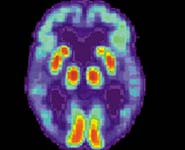Researchers at the University of Bristol's Dementia Research Group supported by the Alzheimer’s Research Trust, the UK’s leading dementia research charity, investigated problems with the function of blood vessels in the brains of people with Alzheimer’s – a known feature of the disease.
Scientists already know that in Alzheimer’s, blood vessels in the brain do not adjust properly in response to changes in brain activity and blood pressure. The vessels also become too permeable, allowing potentially harmful substances to leak into the brain from the bloodstream.
In a new series of studies, PhD student Emma Ashby, Professor Seth Love and Dr Patrick Kehoe found marked abnormalities in the system that helps to regulate blood vessel function in people with Alzheimer’s. Their findings are published in the journals Brain Research and Neurobiology of Aging.
The team looked at an enzyme that helps to control blood flow and the leakiness of blood vessel walls, and found its activity was increased in the brains of people with Alzheimer’s. Alzheimer’s is the most common cause of dementia, which currently affects more than 4,000 people in Bristol alone.
Although it is thought that vascular problems are a symptom of Alzheimer’s disease, rather than a cause, it is hoped that drugs to treat these symptoms could help improve brain function.
Miss Ashby said:“The abnormalities we have found seem to be a reaction to the initial brain damage in Alzheimer’s disease, but they are likely to worsen the damage, diverting blood flow inappropriately and causing the vessels to become leaky. Now we need studies to find out whether using drugs that target blood vessels can prevent these abnormalities and improve brain function.”
Seth Love, Professor of Neuropathology at the University of Bristol said:“Although it is known that there are problems with the function of blood vessels in the brain in Alzheimer’s, this has not received as much attention as other aspects of the disease. These findings give us hope for future research – there are already drugs available that might prove beneficial, and we should look to trial them.”
Dr Simon Ridley, Head of Research at the Alzheimer’s Research Trust, said: “These are promising results that tell us much more about the links between vascular problems and Alzheimer’s disease. It is vital that we invest in more research in this area, to see whether drugs that target these symptoms could be helpful for people with dementia.”
